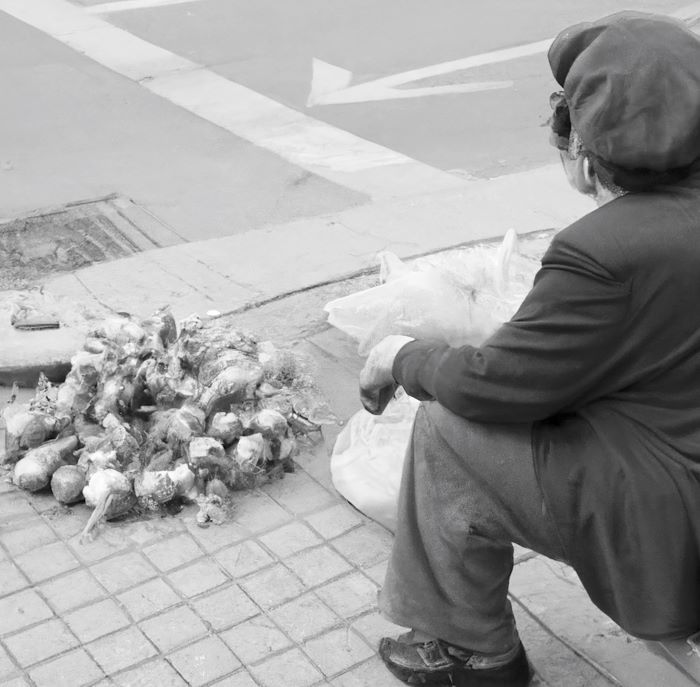The Onion Lady
By Francesca Duong
When I think of onions, I think of their stinging flavor and ability to make people’s eyes overflow with tears. Personally, I have no use for onions; the meals I prepare rarely require them, and I frequently leave them out because I do not want to buy ingredients only used for a single meal.
To stock up my fridge when I first moved into my new apartment in Gwangju, I noticed the sidewalk leading to the supermarket was cluttered with produce stands. Some stands were staffed by multiple ajumma (아줌마) with many tables filled with fruit and produce. Others were ran by a single ajeosshi (아저씨) who stood up from his chair each time a customer walked near. When no customers approached, the owners of the fruit stands would sit on a stool underneath a large umbrella to block them from the harsh sun.
I walked slowly from stand to stand, browsing the collection and comparing different prices. My eyes traveled down a level, settling on a halmeoni (할머니) squatting on the floor. Unlike her competitors, she had no chair and no tables for her produce. She simply had a small umbrella, a bag of onions, and a vegetable peeler in her hand. The cardboard sign signaled it was 1,000 won for a bowl of peeled onions.
That was the first time I noticed “the onion lady.” It felt as if a spotlight encompassed her and focused my attention. Yet, others walked past her without a moment of pause. After I entered and left the supermarket with a bag of groceries, I still felt a string of attachment to the halmeoni peeling away at her onions. Just like the others, I was complicit in walking past her.
As an Asian-American, I grew up with a strong emphasis on taking care of the elderly. Family was of utmost importance, my father taught me. While my house only consisted of me and my parents, my relatives all lived in extended family households. My paternal grandmother and multiple family units live incredibly close to each other in Canada. Similarly, my maternal grandparents live in Southern America with my aunt, with the closest family member occupying a house down the street.
As time passed and my elders’ health deteriorated, they always had a community of family members to help. Someone was available to accompany them to the hospital, and someone could prepare food when they were ill. Because I grew up in this environment, it was shocking moving to South Korea and seeing senior citizens continue to fend for themselves.
Each time I saw the onion lady, a monster of emotions laid heavy on my chest. Each time I saw the onion lady, she was in the same position, curled into a tiny ball. Each time I saw the onion lady, it felt like the harsh sun rays were piercing through her thin umbrella into her skin. The disparities between her tarp on the floor and the other produce sellers were stark. For someone who was the same age as my grandparents, it felt wrong seeing her continue to work. And she was working alone.
According to the Organisation for Economic Co-operation and Development,[1] South Korea has a poverty rate of 40.4 percent for 66-year-olds or more, the highest among any country. Additionally, in 2021, South Korea also had the highest labor force participation rate for people aged 75+.[2] These figures suggest the need for seniors to continue working, with a portion fighting to stay afloat in the economy.
Along with the problem of the aging population and declining birth rate, the national pension fund is set to be depleted by 2057, according to The Korea Times.[3] There is certainly no easy solution to these issues; yet the problems are trickling into daily life. The bus ride to Mudeung-san was packed with the elderly and very few members of the youth. A stroll through the Malbau Traditional Market (말바우 시장) is filled with seniors running stands and buying groceries. A seemingly simple walk to a nearby supermarket, and I can see the onion lady that sits on the cold cement.
“Pity.”
I dislike that word. I dislike saying that I feel pity. While the definition of “pity” is neutral (“sympathetic or kindly sorrow evoked by the suffering, distress, or misfortune of another, often leading one to give relief or aid or to show mercy”),[4] the connotation is packed with nuances. The word suggests a hierarchy in power, where the giver of pity is on a higher pedestal. It feels more judgmental. When others’ pity is rejected through the phrases “stop pitying me” or “don’t give me your pity,” it is the power imbalance that is being rejected.
I have no right to assume a hierarchy with a stranger on the street. I know nothing of their history, of their life. Similarly, to them, I am a simple passerby. My face will quickly be forgotten.
And yet, some feeling – some sadness – compelled me to walk towards the onion lady one day with a 1,000 won bill in hand.
“Gomawoyo” (고마워요, thank you), she said to me as she tossed the onions into a black plastic bag.
No, do not thank me for anything. I do not deserve it.
The Author
As a writer, Francesca Duong strongly believes in the power of narrative as a platform for truth and discussion. She loves lengthy conversations, being involved in the community, and discovering delicious foods.
Sources
[1] OECD. (n.d.). Poverty rate. https://data.oecd.org/inequality/poverty-rate.htm
[2] OECD. (2023, May 15). LFS by sex and age – indicators. https://stats.oecd.org/Index.aspx?DataSetCode=lfs_sexage_i_r
[3] Kim, B. (2022, August 16). Concerns grow over Korea’s pension fund. The Korea Times. https://www.koreatimes.co.kr/www/biz/2022/11/602_334511.html
[4] Dictionary.com. (n.d.). Pity. In Dictionary.com. Retrieved May 15, 2023, from https://www.dictionary.com/browse/pity







